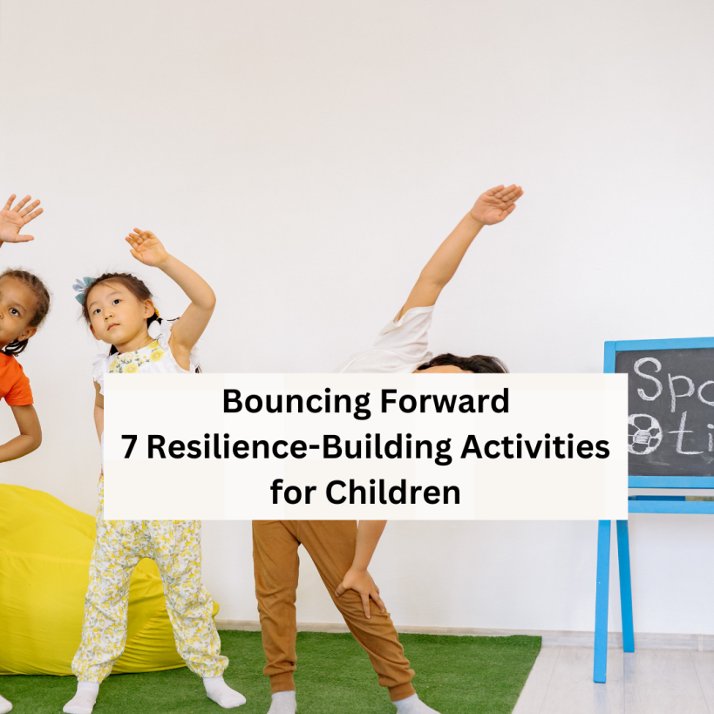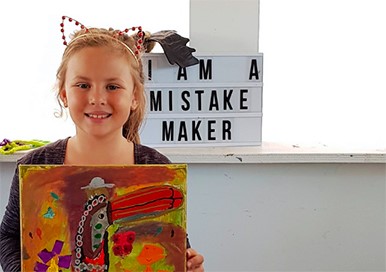
1. Simple Affirmations
Simple affirmations are a easy tool that can be practiced daily. The affirmations can consist of clear and concise messages including but not limited to “i am capable” or “i am brave” the intention of affirmations is directed towards your child’s self belief, and helps affirm growth, and open mindsets. By practicing this simple act of kindness to themselves daily they open themselves up to the acknowledgement of their potential, leading to inclusive and supported mindsets.
This tool is something that can be practiced by both yourself and them at the same time, motivating your children to follow an example. Positive affirmations help children approach situations proactively. For example your child might feel anxious about social situations. By saying things such as “i am friendly” and “i am capable of making friends” can significantly help adjust and affirm positive mindsets, whilst also fostering a belief in themselves.
2. The Challenge Accepted Jar
The “Challenge Accepted” Jar focuses on reflecting when your child has overcome obstacles, and challenges. Resilient child understand the importance of facing these challenges head on, instead of avoiding them. Here’s how it works: when your child faces a difficulty, help them write it down and drop it in the jar. Later, you can talk about it together, brainstorm solutions, and celebrate overcoming the challenge. It’s a fun way to remind and show them they can conquer difficult things!
Teaching your children the importance of acknowledging all that they overcome, even if it was uncomfortable to deal with, helps them understand their growth in resilience.
The act of rewarding your child when the challenge has been overcome is important. This can be something as simple as treating them to their favorite dessert or spending some extra time outside playing a favorite sport or game of theirs. These rewards focus on reflection of their successes and allow your children to be proud of their growth, supporting the idea of perseverance, and self confidence which will be important for their futures.
3. Mistakes are Stepping Stones
Another important activity focuses on turning mistakes into learning opportunities with creative art projects. This can be implemented by using your existing art supplies to encourage your child to incorporate “mistakes” into their artwork. For example, once a mistake is made within their artwork, use it as a learning opportunity to approach the concept of growth mindsets. For example, a painted streak can become part of a tree, or a stray line can become an interesting squiggle.
Let your children understand the importance of unleashing their creative imagination. This focuses on the importance of understanding mistakes don’t mean you have failed, instead, they are important steps in understanding how best you can learn and grow from them. All of our kids workshops are use creative activities to explore the emotions that mistakes can make kids feel and gives them tools for tackling mistakes. Check out our 2 day Mistake Maker Camp.

4. The Gratitude Game
Looking and recognising the good is an important concept to develop in children and is critical when developing resilience from a young age. Helping your child recognise the silver linings in life, even when they are in challenging times, or facing one of life’s many obstacles. Practicing gratitude daily is important, it is an effective and simple tool children can develop especially when led by example from parents, guardians or important people in their life. It can be as simple as replacing “How was your day?” to “What went well today?”
You could also ask questions such as “What are three things you are thankful for today?” “What made you smile today?” These can also be put in a designated “Gratitude Jar” which can be constructed by your child, with their own creative designs. These ideas of gratitude can be written out, and by the end of the week read out.
Showing gratitude is a powerful thing, and it’s easy to make it a habit for kids too! These simple activities help your child appreciate all the good things in their life, big or small. It’s amazing how often we forget to notice the positive, and these exercises can help them build a thankful heart that will last a lifetime.
5. Obstacle Course Challenge
An obstacle course can be a beneficial way to make your child physically have to practice the act of problem-solving. The course can be created from things around your house, including getting your child to hop from one room to another, or crawl on their stomach under the table. This focus of this activity is effective and efficient in allowing your children to understand different approaches in life, and using their critical thinking skills to complete the course.
The result of this activity should be to celebrate your child’s capability of solving the challenges within the course. Whilst also discussing the importance of developing their problem-solving which is importantly interconnected with a child’s resilience. It is important to acknowledge any feelings that the activity might have bought up, including and especially challenged or overwhelming thoughts, or self doubt helping them in understanding the importance of perseverance, and acknowledging the idea of a trying spirit and a “can do attitude” whilst also fostering an environment for positive self-esteem. Check out our Household Scavenger Hunt in our Free Resources Downloads for those stuck at home “I’m bored” days.
6. Growth Mindset Stories
Story books can be an effective way to introduce new and important concepts to your child. Story books can capture the attention of children in a more engaging way encouraging them to understand and practice concepts explored in the book. This is important for exploring creative outlets in your child’s imagination, understanding life skills and tools which will be important throughout their life. or perhaps how to foster an open, and growth mindset.
The possibilities of what stories can illustrate to a child’s mind directly are endless. Open discussions after reading the books can also help develop resilience and understanding of why it is important to expand on the skills focused on within the book. Helping your child explore why certain characters acted in certain ways, overcoming challenges and relating it back to your child and their life is important, and a healthy way to foster the tools developed. Click here for our top resilience themed books that will help develop a growth mindset.
7. Yoga for Kids
The art of yoga is important when promoting resilience in children. It promotes mindfulness, teaching children the importance of focusing on their breath during challenging poses. Connecting this to the importance of focusing on breathwork during challenging situations, or obstacles in their daily life. The incorporation of yoga can also help alleviate stress levels, helping children’s sleep and control of physical and emotional response. Yoga is important as the methods initiated within the art can be focused on within other parts of your life, which is important to start developing from childhood.
By incorporating these simple strategies into your daily routine, you’re nurturing your child’s inner strength hero. From teamwork adventures to celebrating effort, these activities build resilience, a growth mindset, and healthy coping skills. Remember, a happy and supported child is a resilient child, ready to face any challenge life throws their way.
